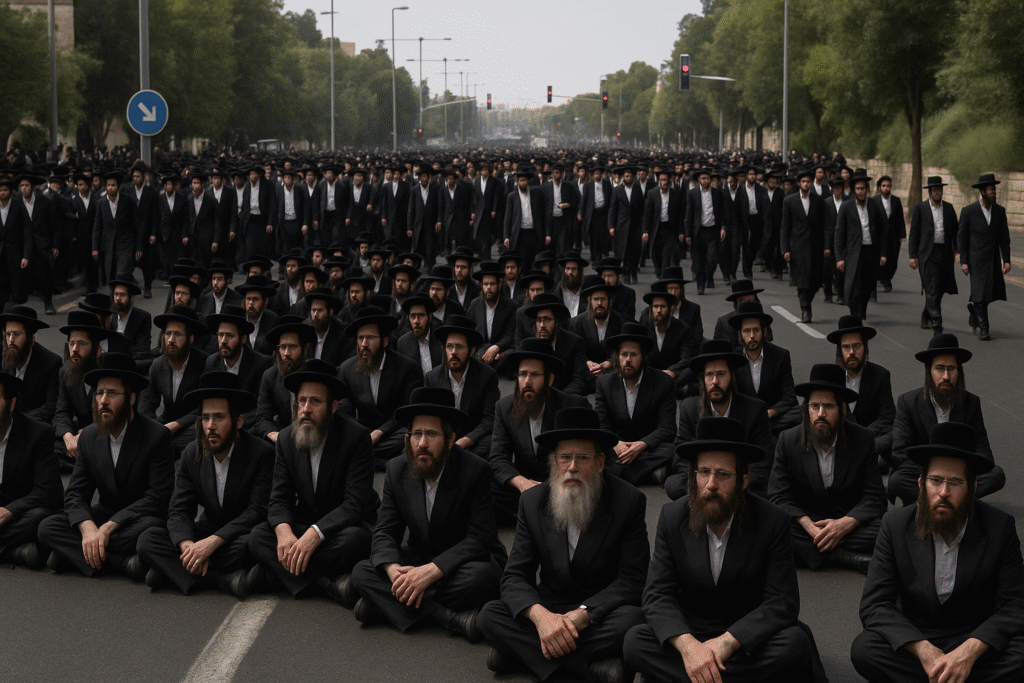Thousands Rally in Jerusalem Over Military
In a powerful demonstration that captured national and global attention, thousands rallied in Jerusalem over military conscription laws that have long sparked tension between Israel’s ultra-Orthodox community and the state. On Wednesday, hundreds of ultra-Orthodox Jewish men took to the streets, blocking a major highway in Jerusalem, voicing their opposition to mandatory military enlistment.
Background to the Protest
The protest was not just an isolated act but a continuation of a decades-long dispute between secular and ultra-Orthodox communities in Israel. Under Israeli law, military service is compulsory for most Jewish men and women upon turning 18. However, for years, ultra-Orthodox men have largely been granted exemptions in favor of full-time religious studies.
The Israeli Supreme Court has, in recent years, ruled that such blanket exemptions are discriminatory and unconstitutional, urging the government to legislate a more equitable solution. The recent protest reflects renewed urgency as lawmakers inch closer to reforms that could potentially revoke exemptions for the ultra-Orthodox.
Thousands Rally in Jerusalem Over Military Reforms
Wednesday’s protest was sparked by proposed legislative changes that would mandate military service for more ultra-Orthodox men. Thousands rallied in Jerusalem over military reforms, expressing concerns that these changes would infringe on religious freedoms and disrupt traditional lifestyles centered on Torah study.
Waving placards and chanting prayers, protesters marched through key roads, ultimately bringing traffic to a standstill. This latest mobilization underscores the community’s deep-rooted resistance to conscription and their determination to protect their spiritual commitments.
Police Response and Public Reaction
The protest saw significant law enforcement presence. Mounted police, riot control units, and border patrol forces were deployed to maintain order and prevent escalation. While the demonstration remained largely peaceful, isolated scuffles between protesters and police did occur.
Public reaction to the protest was divided. Secular Israelis and supporters of equal burden-sharing voiced frustration over the disruption and called for policy that applies universally. Meanwhile, supporters of the protest emphasized religious freedom and cultural respect.
Why Thousands Rally in Jerusalem Over Military Duty
The question of why thousands rally in Jerusalem over military duty dates back to the founding years of the Israeli state. When Israel was established in 1948, only a small number of yeshiva (religious school) students were exempted from military service. Over time, as the ultra-Orthodox population grew, so did the number of exemptions.
Many secular Israelis argue that this system unfairly shifts the burden of national defense onto the rest of the population. On the other hand, the ultra-Orthodox community argues that their religious devotion and spiritual contributions are equally vital to the nation’s identity and moral foundation.
Political Implications
The massive turnout in the recent rally has significant political implications. Prime Minister Benjamin Netanyahu’s government, which includes ultra-Orthodox parties as coalition partners, faces a delicate balancing act. On one hand, there’s pressure from the judiciary and secular constituents to enforce equal conscription. On the other, there’s the threat of losing coalition support if the exemptions are revoked.
As thousands rally in Jerusalem over military draft laws, politicians are forced to tread cautiously. The issue has become a litmus test for Israel’s democracy, pluralism, and societal cohesion.
International Reactions
The demonstration in Jerusalem also drew international media coverage. Videos circulated widely online, showing long lines of men in black coats and hats forming human barricades across highways. Foreign observers noted the complexities involved in Israel’s internal social fabric and the broader challenge of integrating diverse communities under a common national policy.
Diplomatic voices, particularly from Jewish communities abroad, offered mixed responses. While some expressed solidarity with the ultra-Orthodox position, others supported the move towards shared civic duties.
Voices From the Ground
Among those who joined the protest was Rabbi Eliezer Goldstein, a senior member of a Jerusalem yeshiva. “We are not here to defy the state but to defend our way of life,” he said. “Our Torah learning is our form of service.”
Young participants echoed similar sentiments. Yossi Ben David, a 19-year-old yeshiva student, said, “I respect the IDF and what they do. But my calling is in spiritual work. Forcing us into the army would be a spiritual exile.”
What Happens Next?
With thousands rallying in Jerusalem over military service laws, the Israeli government is under renewed pressure to respond decisively. Legal deadlines loom, and the Supreme Court is unlikely to tolerate further delays in implementing its rulings.
There is speculation that a compromise plan may be in the works — one that preserves exemptions for top religious scholars while requiring others to contribute via alternative national service programs. However, such proposals have repeatedly failed to gain consensus in the past.
The Bigger Picture
The fact that thousands rally in Jerusalem over military draft laws highlights a deeper national dilemma. How can Israel maintain its identity as both a Jewish and democratic state when religious and secular values often collide? The military draft issue is a microcosm of broader tensions involving governance, identity, and communal rights.
Many analysts believe that a long-term solution will require not just legislative change, but also cultural dialogue and mutual understanding. Education campaigns, intercommunity discussions, and grassroots efforts may help bridge the gap between the yeshiva and the army base.
Conclusion
The recent protests, where thousands rally in Jerusalem over military obligations, represent more than just resistance to conscription — they are a manifestation of the identity crisis that continues to challenge Israeli society. As the debate intensifies, all eyes are now on the Israeli government, judiciary, and civil society to craft a resolution that honors both national security needs and religious traditions.
Ultimately, whether through continued negotiation or legal enforcement, the nation must reconcile its competing identities to ensure lasting unity and peace. For now, as thousands rally in Jerusalem over military reforms, the conversation is far from over.
